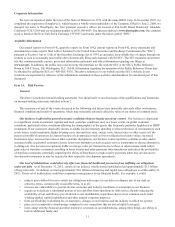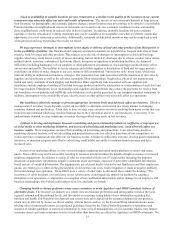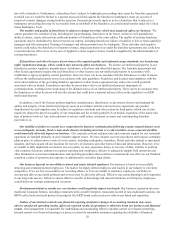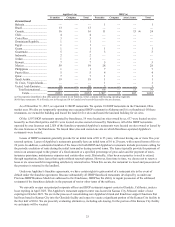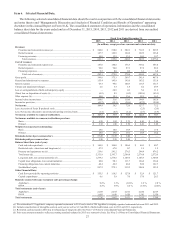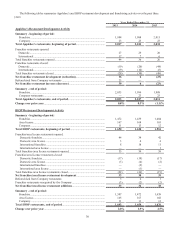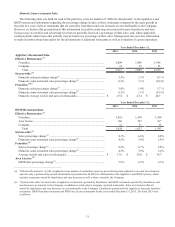IHOP 2015 Annual Report Download - page 41
Download and view the complete annual report
Please find page 41 of the 2015 IHOP annual report below. You can navigate through the pages in the report by either clicking on the pages listed below, or by using the keyword search tool below to find specific information within the annual report.21
reporting for external purposes in accordance with accounting principles generally accepted in the United States. Because of its
inherent limitations, internal control over financial reporting is not intended to provide absolute assurance that we would
prevent or detect a misstatement of our financial statements or fraud. Any failure to maintain an effective system of internal
control over financial reporting could limit our ability to report our financial results accurately and timely or to detect and
prevent fraud. A significant financial reporting failure or material weakness in internal control over financial reporting could
cause a loss of investor confidence and decline in the market price of our common stock.
A change in accounting standards can have a significant effect on our reported results and may affect our reporting of
transactions before the change is effective. New pronouncements and varying interpretations of pronouncements have occurred
and may occur in the future. Changes to existing accounting rules or the questioning of current accounting practices may
adversely affect our reported financial results. Additionally, our assumptions, estimates and judgments related to complex
accounting matters could significantly affect our financial results. Generally accepted accounting principles and related
accounting pronouncements, implementation guidelines and interpretations are highly complex and involve many subjective
assumptions, estimates and judgments by us. Changes in these rules or their interpretation or changes in underlying
assumptions, estimates or judgments by us could significantly change our reported or expected financial performance.
Matters involving employees at company-operated restaurants expose us to potential liability. We are subject to United
States federal, state and local employment laws that expose us to potential liability if we are determined to have violated such
employment laws. Failure to comply with federal and state labor laws pertaining to minimum wage, overtime pay, meal and
rest breaks, unemployment tax rates, workers' compensation regulations, citizenship or residency requirements, child labor
requirements, sales taxes and other employment-related matters may have an adverse effect on our business or operations. In
addition, employee claims based on, among other things, discrimination, harassment or wrongful termination may divert
financial and management resources and adversely affect operations. The losses that may be incurred as a result of any
violation of such employment laws are difficult to quantify.
Item 1B. Unresolved Staff Comments.
None.


